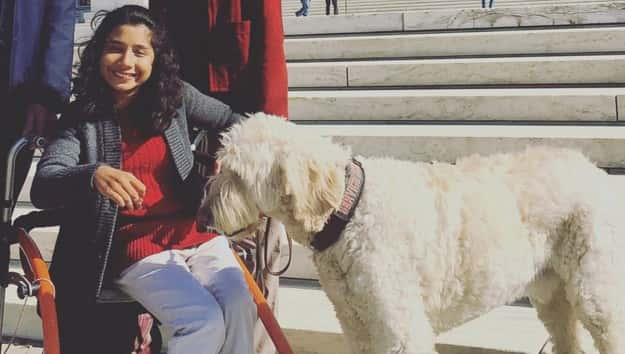
 ACLU(WASHINGTON) — Ehlena Fry, a 12-year-old Michigan girl with cerebral palsy, has been at odds for years with her former school over the use of her service dog Wonder.
ACLU(WASHINGTON) — Ehlena Fry, a 12-year-old Michigan girl with cerebral palsy, has been at odds for years with her former school over the use of her service dog Wonder.
On Monday her case made its way to the Supreme Court.
In 2009, when Fry was just 5 years old, Wonder entered her life. The Goldendoodle was prescribed by her doctor and trained to help Fry with daily activities, including opening doors, turning on and off lights and taking her coat off.
The school denied her family and pediatrician’s request to allow Wonder to assist Fry in the classroom.
Her parents sued in federal court, but the case was dismissed. At issue before the Court is the technical matter of whether the suit can be brought in federal court or should the matter should be resolved in state administrative proceedings.
In 2009, the Napoleon Community Schools and the Jackson County Intermediate School District said that it already had an Individualized Education Program (IEP) that included a human aide to support Fry during the school day, so she did not need Wonder, according to analysis of the case. The school allowed a brief trial period after mediation, but at the end of the school year declined to change their minds.
Fry attended the 2009-10 school year without the service dog. After the school’s decision, the girl’s family pulled her from the school and home-schooled her for two years. In 2010, the family filed a complaint with the Department of Education alleging that the district had violated the “Americans with Disabilities Act (ADA). The government investigated the complaint and sided with her parents.
In response to the decision, the school allowed Fry to bring the dog into the school and she re-enrolled in 2012, but she left for a neighboring district after her parents felt the school administration would “resent” their daughter.
That same year, the family sued the school in federal court, seeking monetary damages for the refusal to allow Wonder in the classroom.
However, a district court dismissed the suit for failure to exhaust administrative remedies. An appeals court agreed with that decision and attorneys for the Frys appealed to the Supreme Court.
“If you’re choosing to bring one of those lawsuits, you got to first exhaust the [Individuals with Disabilities Education Act] IDEA procedures if the relief available is one that you could get from the IDEA,” said Neal Katyal, the attorney for the school distinct, arguing in Court Monday.
He declined to discuss the arguments Monday, citing policy not to comment on-going litigation.
“The legal issues in this case are pretty technical, involving the interaction of a number of federal statutes and the kinds of remedies available under those statutes,” said ABC’s Supreme Court Contributor Kate Shaw.
“The humiliation and discrimination that Ehlena faced when she was in kindergarten won’t have to happen to anybody else. This case is about tearing down barriers to access to school for kids. It’s not only illegal–it’s cruel–to make kids choose between an education and access to an independent life,” said American Civil Liberties Union (ACLU) Michigan Legal Director Michael Steinberg in a statement.
The ACLU has advocated on Fry’s behalf since April 2010.
While Wonder did not attend the proceeding, he did join Fry in front of the Court steps this morning.
Copyright © 2016, ABC Radio. All rights reserved.










